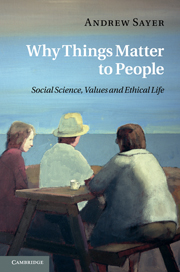Book contents
- Frontmatter
- Contents
- Acknowledgements
- 1 Introduction: a relation to the world of concern
- 2 Values within reason
- 3 Reason beyond rationality: values and practical reason
- 4 Beings for whom things matter
- 5 Understanding the ethical dimension of life
- 6 Dignity
- 7 Critical social science and its rationales
- 8 Implications for social science
- Appendix: Comments on philosophical theories of ethics
- References
- Index
3 - Reason beyond rationality: values and practical reason
Published online by Cambridge University Press: 05 June 2012
- Frontmatter
- Contents
- Acknowledgements
- 1 Introduction: a relation to the world of concern
- 2 Values within reason
- 3 Reason beyond rationality: values and practical reason
- 4 Beings for whom things matter
- 5 Understanding the ethical dimension of life
- 6 Dignity
- 7 Critical social science and its rationales
- 8 Implications for social science
- Appendix: Comments on philosophical theories of ethics
- References
- Index
Summary
Nor is intelligence about universals only. It must also come to know particulars, since it is concerned with action and action is about particulars. Hence … some people who lack knowledge but have experience are better in action than others who have knowledge.
(Aristotle, 1980, The Nicomachean Ethics, 1,141b, 15ff.)Introduction
Many of us are all too familiar with the rise of audits and the imposition of standardized procedures on activities which seem to defy standardization. Supposedly, these provide rational systems for organizing and assessing the performance of individuals and institutions. In universities, research and teaching, as well as a host of other activities, are increasingly audited, rated and ranked. Teaching comes to be modelled as a rational process of setting ‘learning objectives’, deciding how these are to be ‘delivered’, designing assessment procedures that test how far students have achieved the specified ‘learning outcomes’, as if courses consisted of separable bits of knowledge or skill that could simply be ‘uploaded’ by students. The whole technology is intended to allow the process to be analysed and evaluated. Teaching is therefore treated much as a production engineer might treat an industrial process – as capable of being broken down into rationally ordered, standardized, measurable units, so that wastage and inefficiency can be identified and eliminated, and quality improved. A general, abstract technology is thus applied to every course, from aesthetics to zoology.
- Type
- Chapter
- Information
- Why Things Matter to PeopleSocial Science, Values and Ethical Life, pp. 59 - 97Publisher: Cambridge University PressPrint publication year: 2011



